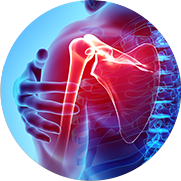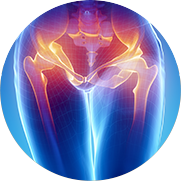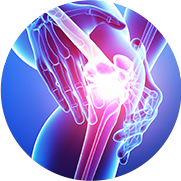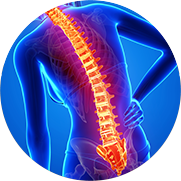Arthritis literally means “inflammation of a joint.” In some forms of arthritis, such as osteoarthritis, the inflammation arises because the smooth covering (articular cartilage) on the ends of bones wears away. In other forms of arthritis, such as rheumatoid arthritis, the joint lining becomes inflamed as part of a systemic disease. These diseases are considered the inflammatory arthritides.
The three most common types of inflammatory arthritis that affect the hip are:
- Rheumatoid Arthritis – a systemic disease of the immune system that usually affects multiple joints on both sides of the body at the same time
- Ankylosing Spondylitis – a chronic inflammation of the spine and the sacroiliac joint (the point where the spine meets the pelvic bone) that can also cause inflammation in other joints
- Systemic Lupus Erythematosus – an autoimmune disease in which the body harms its own healthy cells and tissues
Signs and Symptoms
The classic sign of arthritis is joint pain. Inflammatory arthritis of the hip is characterized by a dull, aching pain in the groin, outer thigh, or buttocks. Pain is usually worse in the morning and lessens with activity; however, vigorous activity can result in increased pain and stiffness. The pain may limit your movements or make walking difficult.
Diagnosis
During the physical examination, your physician may ask you to move your hip in various ways to see which motions are restricted or painful. Your physician will want to know if you walk with a limp, if one or both hips are painful, and if you experience pain in any other joints. X-rays (radiographs) and laboratory studies will be needed. The x-rays will show whether there is any thinning or erosion in the bones, any loss of joint space, or any excess fluid in the joint. Laboratory studies will show whether a rheumatoid factor or other antibodies are present.
Treatment
Treatment depends on the diagnosis.
Nonsurgical Treatment
If you have an infection in the hip joint, it must be eliminated, either through the use of medications or through surgical draining. Nonsurgical treatments may provide some relief with relatively few side effects or complications:
- Anti-inflammatory medications, such as aspirin or ibuprofen, may help reduce the inflammation.
- Corticosteroids are potent anti-inflammatories, part of a drug category known as symptom-modifying antirheumatic drugs (SMARDs). They can be taken by mouth, by injection, or as creams applied to the skin.
- Methotrexate and sulfasalazine may be prescribed to help retard the progression of the disease. These medications are part of a drug category called disease-modifying antirheumatic drugs (DMARDs). For example, tumor necrosis factor is one of the substances that seem to cause inflammation in people with arthritis. Newer drugs that work against this factor seem to have a positive effect on arthritis in some patients as well.
- Physical therapy may help you increase the range of motion, and strengthening exercises may help maintain muscle tone. Swimming is a preferred exercise for people with ankylosing spondylitis.
- Assistive devices, such as a cane, walker, long shoehorn, or reacher, may make it easier for you to do daily living activities.
Surgical Treatment
If these treatments do not relieve the pain, surgery may be recommended. The type of surgery depends on several factors, including your age, the condition of the hip joint, the type of inflammatory arthritis you have, and the progression of the disease. Your orthopaedic surgeon will discuss the various options with you. Do not hesitate to ask why a specific procedure is being recommended and what outcome you can expect. Although complications are possible in any surgery, your orthopaedic surgeon will take steps to minimize the risks.
The most common surgical procedures performed for inflammatory arthritis of the hip include:
- Total hip replacement is often recommended for patients with rheumatoid arthritis or ankylosing spondylitis because it provides pain relief and improves motion.
- Bone grafts may help patients with systemic lupus erythematosus to build new bone cells to replace those affected by osteonecrosis. People with systemic lupus erythematosus have a higher incidence of this disease, which causes bone cells to die and weakens bone structure.
- Another option for patients with systemic lupus erythematosus and osteonecrosis is core decompression, which reduces bone marrow pressure and encourages blood flow.
- Synovectomy (removing part or all of the joint lining) may be effective if the disease is limited to the joint lining and has not affected the cartilage.











